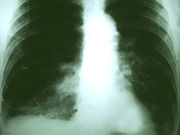And, nivolumab plus ipilimumab linked to better survival in NSCLC with high tumor mutational burden
MONDAY, April 16, 2018 (HealthDay News) — For metastatic non-small-cell lung cancer (NSCLC), the addition of pembrolizumab to standard chemotherapy is beneficial; and nivolumab plus ipilimumab is associated with better survival than chemotherapy for NSCLC with high tumor mutational burden, according to two studies published online April 16 in the New England Journal of Medicine to coincide with the annual meeting of the American Association for Cancer Research, held from April 14 to 18 in Chicago.
Leena Gandhi, M.D., from the NYU Perlmutter Cancer Center in New York City, and colleagues randomized 616 patients with metastatic nonsquamous NSCLC without sensitizing EGFR or ALK mutations to receive pemetrexed and a platinum-based drug plus either 200 mg of pembrolizumab or placebo. The researchers found that the estimated rate of overall survival was 69.2 and 49.4 percent, respectively, in the pembrolizumab-combination group and the placebo-combination group at 12 months (hazard ratio for death, 0.49).
Matthew D. Hellman, M.D., from the Memorial Sloan Kettering Cancer Center in New York City, and colleagues randomized patients with stage IV or recurrent NSCLC that was not previously treated to receive nivolumab plus ipilimumab, nivolumab monotherapy, or chemotherapy. The researchers found that patients with a high tumor mutational burden had significantly longer progression-free survival with nivolumab plus ipilimumab versus chemotherapy. The one-year progression-free survival rate was 42.6 versus 13.2 percent with nivolumab plus ipilimumab versus chemotherapy; median progression-free survival was 7.2 versus 5.5 months (hazard ratio for progression or death, 0.58).
“Progression-free survival was significantly longer with first-line nivolumab plus ipilimumab than with chemotherapy among patients with NSCLC and a high tumor mutational burden, irrespective of programed death liand-1 expression level,” Hellman and colleagues write.
The Gandhi study was sponsored by Merck; the Hellman study was funded by Bristol-Myers Squibb and Ono Pharmaceutical.
Copyright © 2018 HealthDay. All rights reserved.








